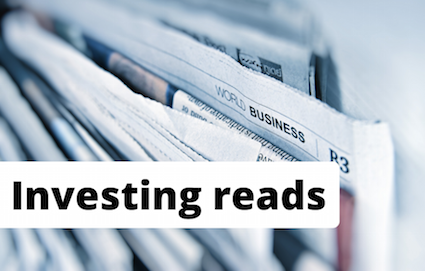Don’t fall into the well: four income stocks outside oil

This is a very imprudent course of action. These cyclical sectors are prone to volatility, as evidenced by dividends cuts during Covid-19, and the future of fossil fuels is a foregone conclusion.
Instead, investors should look to other areas that can consistently deliver robust dividends. We target companies in structurally growing sectors, with a competitive advantage providing them with prolonged pricing power. We are confident these businesses will maintain healthy dividends and dividend cover, which will underpin our yield target of 4% over the long term.
Driving higher dividends
In the current uncertain environment, there are exciting opportunities not least within our existing portfolio, where we have been adding to some positions to take advantage of the market weakness. Sabre Insurance is a motor insurance company we have held since March 2019, which dominates the premium and hard-to-insure vehicle categories.
Market Movers Blog: US unemployment remains steady in April
Due to its specialism, it is a high margin business relative to the insurance industry and pays a substantial dividend – forecast at 6% for this year. Moreover, its competitive advantage lies in proprietary data processes and intellectual property, leaving Sabre Insurance less vulnerable to wage inflation.
At the start of 2022, new regulation came in to play to prevent insurers from charging automatic fee increases for existing clients. Although many relied on this as an added source of profitability, Sabre Insurance did not have this policy in place – and has not had to address revenue loss as a result. Meanwhile, as insurance prices are raised to compensate for the change in regulation, Sabre Insurance will also be able to benefit. We have recently added to our position, as we believe there could be material capital growth ahead for the company.
Tasty long-term returns
UK businesses have been hit hard by rising food and fuel costs, as well as wage pressures in recent months. Although some of its primary inputs are wheat and petrol, Domino’s Pizza has fared remarkably well in the inflationary environment.
As a franchise business, much of the impact of price rises fall on the franchisees rather than the business itself. In return, the business has recently agreed to take on more marketing and IT spend so the franchise owners do not have to spend at a local level. By re-negotiating the franchise terms in the past six months, the business has created goodwill from its franchisees.
This will allow Domino’s, which generates revenue from franchise royalties, to concentrate on growing the business. The company recently sold out of its loss-making segments in the Nordics and Switzerland to focus on deepening its customer base in the UK and Ireland. In light of these recent moves and the potential for steady long-term growth, we have increased our position in the brand. Domino’s Pizza currently has a dividend yield of circa 3%.
Healthy yields for life
The Covid-19 pandemic has accelerated technology adoption in many sectors, particularly the lagging healthcare space. EMIS Group is the leader in providing mission-critical software to GP practices in the UK. Its patient management software has over 50% market share in England.
As the software is essential for GPs to run their practices, EMIS Group possesses pricing power and the ability to pass on cost increases to customers. It also has few competitors, as the barriers to becoming an approved NHS provider are high. Meanwhile, its contracts with GP practices are long term and inflation linked, providing predictable revenue streams for investors.
Bank of England hikes interest rates to highest level since 2009
The business has not been affected by the economic cycle, and benefits instead from high levels of long-term investment into healthcare. With a circa 3% dividend yield per year, we believe this is a long-term play. The business is also looking to develop its presence in the pharmacy and hospital segments, which could bring additional growth.
Structuring steady income streams
The volume of insolvencies has been exceptionally low in the UK over the past decades, and many struggling businesses were further kept afloat by Covid-19 relief packages. As these support measures begin to be dialled back, this will unfortunately mean more business failures.
Solvency and restructuring consultancy FRP Advisory is taking market share in this space. This means while macro dynamics present structural tailwinds for the company, FRP Advisory does not need a wave of corporate administrations to perform well. It is already a growing company with net cash and high margins, which is also involved in transactional M&A.
When FRP Advisory transitioned from a partnership model to a public company, it put in place a share ownership scheme to reward employees. This provides the company with an additional incentive to maintain robust dividends for investors – currently at 3.4%.
Ken Wotton, co-manager of LF Gresham House UK Multi Cap Income fund
World News || Latest News || U.S. News
Source link



